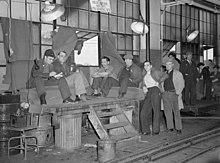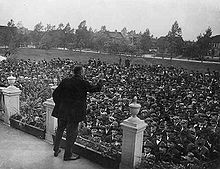Maurice Sugar
American political activist
Maurice Sugar (August 8, 1891 - February 15, 1974) was an American political activist and labor attorney. He is best remembered as the General Counsel of the United Auto Workers Union from 1937 to 1946.

Sit down and rest your feet
Sit down, you got ’em beat
Sit down, sit down!

When you want the boss to come across—sit down, sit down

When the boss see that he’ll want a little chat—sit down, sit down
Quotes
edit"Sit Down, Sit Down" (1937)
edit- "Sit Down, Sit Down" (1937), recorded with the Manhattan Chorus in April 1937
- When they tie the hands of the union man—sit down, sit down
When they give ’em a pact they’ll take them back—sit down, sit down
- When they smile and say, “No raise in pay!”—sit down, sit down
When you want the boss to come across—sit down, sit down
- When your feet are numb just twiddle your thumb—sit down, sit down
When you want ’em to know they’d better go slow—sit down, sit down
- When the boss won’t talk go and take a walk—sit down, sit down
When the boss see that he’ll want a little chat—sit down, sit down
- Sit down, just keep your seat
Sit down and rest your feet
Sit down, you got ’em beat
Sit down, sit down!- Chorus
Quotes about Sugar
edit- In the 1920s, the flourishing automobile industry brought prosperity to Detroit, Michigan. With the 1929 stock market crash and the onset of the Great Depression, car sales collapsed, and production plummeted. The depression forced General Motors and other car companies to lay off many of their workers in Detroit.
On March 7, 1932, a march of unemployed autoworkers was met with violence when four workers were shot to death by the local police and security guards employed by the Ford Motor Company. The Ford Hunger March, as the demonstration became known, contributed to the creation of the United Automobile Workers (UAW) labor union. Four years later, the UAW staged a strike that began in December 1936. Some 100,000 autoworkers simply sat down on the job and occupied 17 General Motors plants. “Sit Down,” written by attorney Maurice Sugar, became an anthem of the strikers. After f44 days, the strike ended in a victory for UAW, thanks in part to a labor-friendly governor, Frank Murphy, who used the National Guard as a peacekeeping force that assisted negotiations. The UAW gained union recognition from General Motors and a promise the company would not fire or otherwise punish the strikers. Workers also received a wage increase of five cents an hour. Maurice Sugar went on to serve as general counsel of the UAW from 1937 to 1946.- Bill of Rights Institute, background on Maurice Sugar and his 1937 pro-union song "Sit Down, Sit Down"
- Maurice Sugar, a legendary figure in Detroit labor and civil rights communities, was the son of Lithuanian immigrants who settled in Michigan’s Upper Peninsula. Born in 1891, Sugar grew up enamored of the lumberjack lore of the north woods and his early learning on labor and class conflict came from their work world experiences and, later, his family’s struggle to make a living in Detroit.
Sugar chose to study law at the University of Michigan partly because it had a three year degree program that would be cheaper than paying for four years at school. While there Sugar’s experiences were shored up by socialist politics. His first labor case came in 1916 when the International Typographers Local 18 hired him to represent the local during a strike.
His beliefs were put to the test in 1918 when he refused to serve in the military during World War I and served a 10-month jail sentence. After imprisonment, Sugar continued his leftward development and involvement in labor issues. He soon became a legal bulwark of the developing autoworkers’ organizing efforts.
Early on Sugar displayed his endearing talent for parody songwriting as he worked with unions, unemployed councils and civil rights fighters. During a March 6, 1930 rally of the Detroit Unemployed Council, his “Soup Song” was sung by thousands in Detroit, and indeed, became an anthem across the country for activists.- Buck Dinner, pro-labor union activist organization, "Maurice Sugar"
- The very first Buck Dinner cause was unemployment, both in its financial support and the efforts of the participants. Times being what they were, employment, hunger and workers organizing were high in the hearts of activists during the 1930s. As the labor movement developed Maurice Sugar and younger lawyers such as Ernest Goodman and George Crockett developed the emerging specialties of labor law, workers compensation and civil liberties.
These skills were sorely needed. In the 1930s and extending into the 1950s, the Dies Committee (which became the House Un-American Activities Committee) and the Federal Bureau of Investigation intensified their harassment of civil libertarians.
These pioneering legal minds also pursued defending African-Americans from unjust, racist charges, and eventually became strong legal supporters of the Civil Rights and peace movements during the 1950s and 1960s. The Buck Dinner distinguished itself by also being a financial supporter of these causes.
But back in the late 1930s, the rise of Nazi Germany and fascist Italy were also on the minds of many in the Buck Dinner community. When those countries supported Franco rebels in Spain, several of our own Detroit progressives volunteered to fight on the loyalist side. When 11 Detroiters were arrested and charged with conspiracy to recruit Americans for a foreign army in 1940, the NLG through Sugar and Goodman led the legal team that freed them.- Buck Dinner, pro-labor union activist organization, "Fight for Justice"